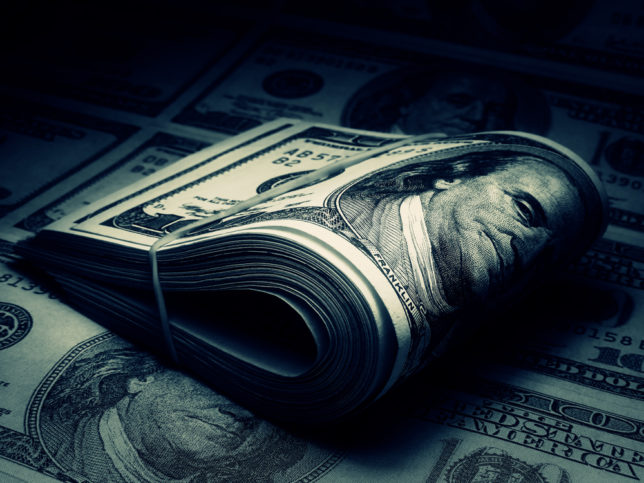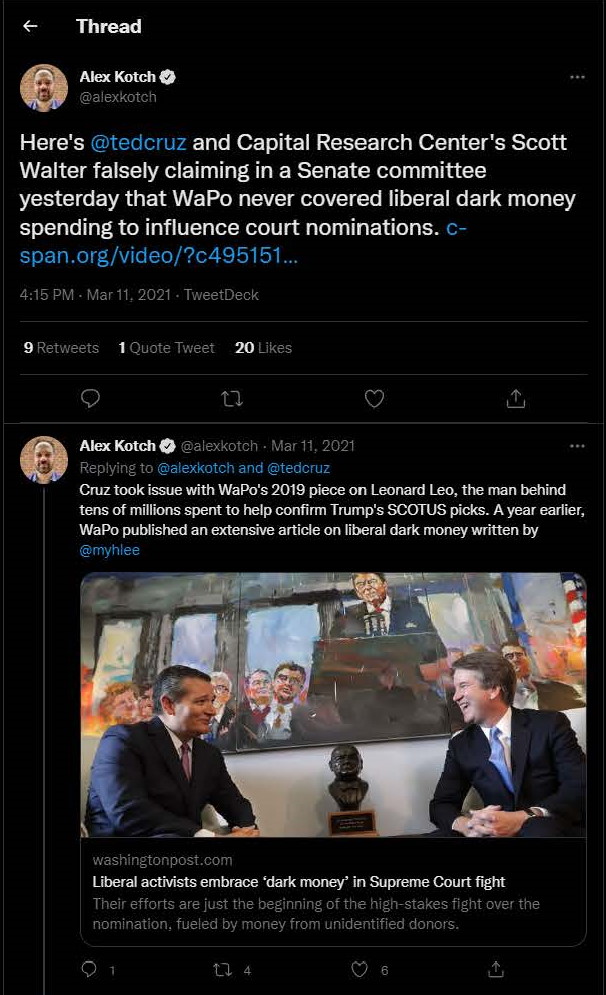Organization Trends
My Mistake on “Dark Money”—and How It Reveals Media Bias in Covering This Subject
 Credit: isak55. License: Shutterstock.
Credit: isak55. License: Shutterstock.

A year ago, in March 2021, I testified to a Senate Judiciary subcommittee hearing with the partisan title, “What’s Wrong with the Supreme Court: The Big-Money Assault on Our Judiciary.” And I made a mistake.
I stressed that the Left—under any of the multiple, slippery usages of “dark money” found in the “Captured Courts” report by the subcommittee’s chairman, Sen. Sheldon Whitehouse (D-RI)—has a lot more “dark money” than the conservatives that the Left attacks when discussing the courts.
But I made an error, as I discovered long afterward when reading a tweet by Alex Kotch, a writer for the left-wing “watchdog” Center for Media and Democracy (CMD).
“Here’s @tedcruz and Capital Research Center’s Scott Walter falsely claiming in a Senate committee yesterday that WaPo never covered liberal dark money spending to influence court nominations,” he tweeted, linking to a 2018 Washington Post report, “Liberal activists embrace ‘dark money’ in Supreme Court fight.”
In that article, the Post documents the Left’s campaign to influence judicial confirmation battles, headed by the then-newly formed group Demand Justice, which “mask[ed] not only the names of its donors but the size of their contributions.”
I apologize for my mistake. Mr. Kotch was right, and I was wrong about whether the Post had mentioned Demand Justice in its pages.
But honesty all around requires Kotch and CMD to confess the ways that the Post’s coverage of “dark money” on the Left was quite different from its coverage of conservative so-called “dark money” in court battles.
Let’s set the record straight. Let’s compare the Post’s coverage of Demand Justice with its vast exposé a year later on groups associated with Leonard Leo, the Left’s favorite conservative “dark money” boogeyman.
How Much Ink?
The Post’s Demand Justice report was about 1,000 words. Compare that to the 4,000-plus words it devotes to criticizing Leo.
A second major difference in the treatment of the two sides: The Post article CMD’s Kotch cites, which mentions Demand Justice on the left, is careful to spend much of its ink on the other side of the battle, right-wing “dark money” groups like those associated with Leo. By comparison, the Post’s critique of Leo, though four times longer, hardly hints that any comparable left-wing “dark money” groups even exist. No mention of Demand Justice. No mention of its fiscal sponsor, Sixteen Thirty Fund. No mention of Arabella Advisors.
Who’s Got a Network?
At least in the Post’s article on Demand Justice, it also mentioned the Sixteen Thirty Fund, then the Arabella-run fiscal sponsor bankrolling Demand Justice, but the Post immediately compares Sixteen Thirty to the opposite side’s Wellspring Committee, which funds conservative groups.
Had the Post gone digging properly, it would have reported that the Sixteen Thirty Fund is just one of four large, politically active nonprofits run by Arabella Advisors, whose network raked in a stunning $1.2 billion in the 2018 election cycle—more than double the funds raised by the Democratic National Committee and Republican National Committee combined. That two-year sum of fundraising dwarfs the four-year fundraising total (2014–2017) for the conservative groups the Post criticized in its Leo article.
In all those thousands of words on Leo in 2019, the Post didn’t mention or use any relevant information from its 2018 article that mentions Demand Justice.
Worse, the Post never mentioned Arabella or its “dark money” empire before my colleagues and I exposed it in a groundbreaking 2019 report—except, that is, to gush that supermodel Christy Turlington dined with Arabella CEO Eric Kessler and staff in 2015.
In fact, I mistakenly missed the Post’s article on Demand Justice because I foolishly searched the Post for “Arabella Advisors,” assuming that of course a story about the left side of the court battles would have to mention this wealthy and amazing network.
Loaded Language
There are still other differences in the Post’s coverage of the two sides in court fights. Note how when going after Leo, the Post describes him as the “maestro of a network of interlocking nonprofits”—described as a “network” 11 times in the article—“working on media campaigns and other initiatives to sway lawmakers by generating public support for conservative judges” and sharing “finances,” board members, “phone numbers, addresses, back-office support and other operational details.”
Arabella’s much larger nonprofit network apparently is not an example of “undisclosed interests” harnessing nonprofits to reshape the country’s politics, judging by the Post’s article that mentions Demand Justice but never explains the much larger network run by Arabella, a network that trades millions in funding back and forth, has interlocking boards, shared financial officers, and more.
How Many Groups?
According to the Post, the Leo network consists of at least a dozen groups that the Left claims are responsible for a sinister, ideologically driven campaign to “capture” the country’s courts. Yet in its coverage of Demand Justice, the Post mentions only one other left-wing group: the Sixteen Thirty Fund. Left unmentioned is Arabella Advisors itself or the firm’s influential network. In fact, the Post seems more interested in exposing the conservative Judicial Crisis Network, Wellspring Committee, and Americans for Prosperity in an article ostensibly about a left-wing “dark money” powerhouse.
So the Post can only mention two groups on the left side of court battles, even though the Arabella network has spawned hundreds of “pop-up” groups, so called because they’re little more than websites that pop into existence to attack conservatives and then disappear when the campaign wraps up. Until spinning off last year, Demand Justice was one such group, created to block the confirmation of President Trump’s judicial nominees. None of these pop-up groups filed IRS disclosures, nor is anything about their boards, budgets, or lobbying known.
How Much Cash?
The Post is conspicuously quiet about just how much “dark money” Demand Justice possessed in 2018—only that it wanted to raise $5 million to block the confirmation of Justice Brett Kavanaugh to the Supreme Court.
Yet the Post spent nine paragraphs pointing out the vast, multi-million dollar “dark money” lobbying campaigns by the right-leaning Judicial Crisis Network and Koch-backed Americans for Prosperity to support Kavanaugh’s confirmation.
That right-wing network supposedly brought in more than $250 million in “dark money” between 2014 and 2017, according to the Post (though no detailed accounting is given).
If that seems impressive, it’s nothing next to the $1.5 billion the Arabella network raised over that same period. Arabella’s largest nonprofit, the New Venture Fund, raised more in a single year—$265 million in 2016—than Leo’s entire network raised in four.
Stretching Credibility
It’s hard to imagine that Kotch and the Center for Media and Democracy are unaware of the Post’s biased reporting on “dark money.” Yet CMD’s website doesn’t mention Arabella Advisors or Demand Justice. Neither does its sister site, PR Watch, which has hundreds of references to the Koch brothers across 25 pages of Google search results.
SourceWatch, CMD’s website for exposing “dark money” political interests, doesn’t even have a page for Arabella Advisors, Demand Justice, or most of the umbrella nonprofits in the Arabella network—the best you’ll find is a bland article on Arabella founder Eric Kessler quoting his official New Venture Fund biography.
No wonder CMD wants to defend the highly biased reporting of the Washington Post.




